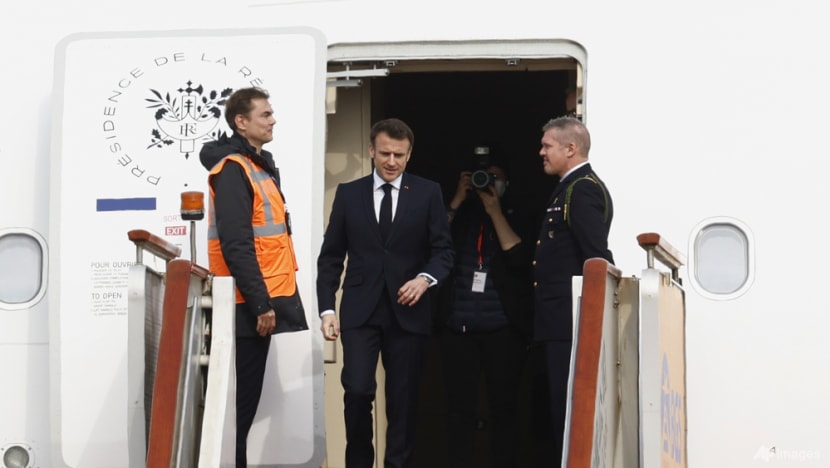Observers pessimistic on outcomes of talks between Chinese and European leaders
French President Emmanuel Macron and European Commission chief Ursula von der Leyen are visiting China this week.

French President Emmanuel Macron arrives at Beijing Capital International Airport in Beijing, China, Apr 5, 2023. (Photo: AP/Gonzalo Fuentes)
As leaders of France and the European Union arrive in Beijing on Wednesday (Apr 5) seeking to reset ties with China, analysts are keeping expectations in check over the outcomes of talks that will focus heavily on the war in Ukraine, trade and diplomacy.
French President Emmanuel Macron is on his first trip to China since 2019, while European Commission president Ursula von der Leyen is on her maiden official visit since her appointment as EU’s chief.
Talks are set to be dominated by Russia’s invasion of Ukraine, with both European leaders hoping to sway China’s stance and persuade Beijing to play a major role in peace efforts.
Observers said they are not optimistic about the outcome of the talks.
“I'm not expecting much,” Emeritus Professor Jean-Pierre Cabestan of Hong Kong Baptist University’s faculty of social sciences told CNA's Asia Now.
“Personally, I'm very sceptical about the ability of Macron and von der Leyen to change China's views on the war."
The prevailing hurdles are China’s friendship with Russia and Beijing’s stance on the North Atlantic Treaty Organization (NATO), experts said.
CHINA’S VIEWS ON RUSSIA AND UKRAINE
Ahead of his trip to China, Mr Macron spoke to United States President Joe Biden about engaging Chinese President Xi Jinping in seeking a solution to the Ukraine conflict.
While the EU and the US are united on their position on NATO, China has a different view of the military alliance, experts said.
“On Ukraine, the interests of the European Union and the United States are very much aligned and highlighted by the growing role of NATO in the security of Europe,” said Prof Cabestan.
But Beijing views NATO as a culprit of the conflict, he added.
State media outlet China’s People Daily ran a commentary last year blaming the “eastward enlargement of NATO, led by the United States, as the root of the Ukrainian crisis”, according to the South China Morning Post.
Beijing has also stood firm on its “no-limits” partnership with Moscow, and both nations have reaped huge economic benefits from their friendship.
China is among the top recipients of Russian oil and natural gas following western sanctions on Moscow over the Ukraine invasion. Its trade with Russia hit a record high last year and has continued to surge at a double-digit pace this year.
“China and Russia share a lot of strategic and economic interests. Clearly, the intention to keep this partnership with Russia is very strong. So in that context, I don't think that Mr Xi is going to put much pressure on Russia,” said Prof Cabestan.
EU’S VIEWS ON CHINA
Mr Macron and Ms von der Leyen’s visit comes on the back of deteriorating relations between the West and China in recent years over “a number of issues” – not least China’s stance on Ukraine, analyst Philippe Le Corre said.
“What's important for the Chinese leaders to understand is that on a daily basis, Europeans are watching this war unfold in Ukraine. It's not business as usual,” said Mr Le Corre, who is a senior fellow at the Asia Society Policy Institute’s Center for China Analysis.
“From French President Macron’s point of view, he has to go back home with ... at least commitments (from Beijing), one step further from the sort of neutrality that China has been talking about, which is not considered as neutral in most circles.”
Ties have also soured over “market discrepancies”, said Mr Le Corre, citing EU chief von der Leyen’s call for more defensive tools – such as anti-coercion instruments – to counter China’s assertiveness as a “systemic rival”.
Furthermore, there is a desire among EU member states to reduce the alliance’s economic dependence on China, said Prof Cabestan. He added that some countries have placed tougher screenings on Chinese investments and put in place safeguards to prevent the transfer of military and digital technologies to Beijing.
“It's not the end of business, but I think business with China will become more selective,” he said.
CHINA-EU ECONOMIC TIES
China’s ambassador to the EU Fu Cong last week renewed calls to revive a proposed investment deal between the EU and China, which has been stalled since 2021 as a result of tit-for-tat sanctions over human rights concerns.
Mr Fu suggested that the Comprehensive Agreement on Investment (CAI) can move forward if sanctions on both sides were mutually lifted.
However, Mr Le Corre said he is not optimistic about any progress on the agreement, at least not during this week’s diplomatic visits, as many of the EU parliamentarians sanctioned by China are not represented.
“Some of the reasons why the deal is now frozen have not really changed. For example, China's commitments to ratifying the convention on forced labour, the repression against the Uyghur minority in Xinjiang ... all these things are still happening,” he told CNA’s Asia Tonight.
However, he expressed hopes that Mr Macron and Ms von der Leyen’s trip will kick-start more diplomacy between the EU and China.
“It's difficult because there are so many discrepancies and differences between the two sides,” said Mr Le Corre.
“Let's hope they at least engage this time, which is not a foregone conclusion ... This will be followed by more visits and exchanges, which are utterly necessary.”
Mr Macron is set to hold talks with China’s President Xi and other officials on Thursday and visit the Chinese city of Guangzhou on Friday.













